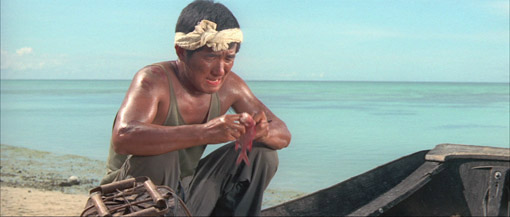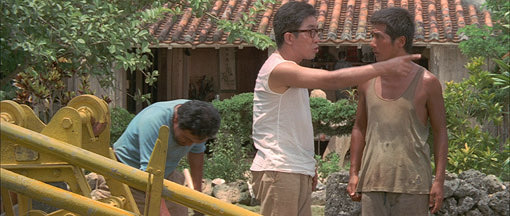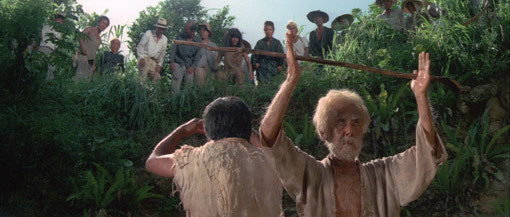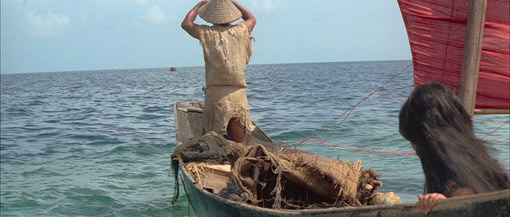|
It's with some shame that I admit to coming to the cinema of Imamura Shohei considerably later than I should have, given the passion for Japanese cinema that was sparked by teenage viewings of films like Seven Samurai, An Autumn Afternoon and Onibaba. Not only that, I came to his films in reverse, my first being his 1997 Unagi [The Eel], a late career work for a man whose first feature was released back in 1958. I'd only seen two more of his films – the 1979 Vengeance is Mine [Fukushû suru wa ware ni ari] and his final feature, the 2001 Warm Water Under a Red Bridge [Akai hashi no shita no nurui mizu] – by the time I was given a tour of the film school he founded, which by then had been relocated from Yokohama to custom-built premises just outside of Tokyo. At the time a new intake of students had just completed their induction and were cheerfully responding to the relaxing effects of sake, but the sheer quality of the work by that year's graduate students was a testament to the high standard of teaching for which the school is still rightly respected.

Imamura was a filmmaker who liked to get under the surface of Japanese society and had a particular fascination for both human sensuality and those on the lower levels of the Japanese social strata. Asked to define his cinematic interests by critic Yamada Koichi, he replied, "I am interested in the relationship between the lower part of the human body and the lower part of the social structure on which the reality of everyday life in Japan is built."* I've still not seen enough of Imamura's work to be able to comment on the consistency of these chosen themes, but you'll find plenty of evidence of both in his 1968 film, Profound Desires of the Gods [Kamigami no Fukaki Yokubo], a film that is part ethnological drama, part socio-political commentary, and part...well... actually slotting this film comfortably into any ready-made category is a task best left to those with a marketing need to do so.
The film is set in on the fictional island of Kurage in Okinawa, the hottest and southernmost prefecture of Japan. The area has been in the news recently following prime minister Hatoyama Yukio's resignation from office, in part for failing to deliver on his promise to move the unpopular US military base, which has been there since the war, to a more population friendly location elsewhere. It remains a popular holiday destination for Japanese tourists and was a key location for Kitano Takeshi's pitch-perfect yakuza film Sonatine and the popular Japanese gangland video game Yakuza 3. None of which will prepare you for Imamura's take on the region and its people.
The film revolves round the Futori family, who by the time we meet them have already managed to socially isolate themselves from just about everyone else on the island. The bedraggled Nekichi is chained to his work in a watery pit that he's been digging for years to dislodge a huge rock that many believe was deposited there by the gods as punishment for his earlier deeds, which include fishing with dynamite and a passionate love affair with his sister Uma, now the wife of his former comrade Ryūgen. With me so far? Grandfather Yamamori is worried that Nekichi's continued longing for Uma will anger the gods further, but given that Yamamori slept with his daughter and made her pregnant, he's not really in a position to dish out a lecture. The result of this union was the half-witted Toriko, who delights at everything she sees and appears to have slept with just about everyone except Nekichi's son Kametarō, the only even remotely level-headed member of the entire family.

Into this offbeat micro-society lands company engineer Kariya, a Tokyo-based family man who is ill equipped to cope with the eccentricities of the Futori clan, or even those of his host Ryūgen, whose idea of hospitality is to order his wife to show their visitor a good time. When he fights her off – and he really has to fight – Ryūgen's anger at his wife's failure manifests itself in physical violence and rape. After hiring Kametarō as an assistant and tempting him with prospects of life in the big city, Kariya is targeted by the perpetually playful and amorous Toriko, who wears down his resistance and prompts him to abandon his work to live a more primitive and idyllic life with the Futori clan.
If it seems as if I've given the entire plot away then be assured that I've only provided the basics here. The film is almost three hours long, is littered with offbeat and often surreal detail, and is underpinned by a number of thematic concerns, from Imamura's fascination with primitivism to the intrusive and destructive effect of industrial development, a theme that was dear to many in the 60s and despite its essential truth has since slipped into the realms of cinematic cliché. Even in retrospect, however, Imamura's handling is infinitely more layered and persuasive than James Cameron's mind-numbingly clumsy attempt at the same in Avatar. Here paradise is tainted long before the timeframe of the film begins, the islanders having been persuaded to switch from a rice to sugar cane farming, primarily to serve a factory constructed by mainlanders that now governs the island's economy. Kariya has been sent to construct a fresh water well after his predecessor stopped filing reports and went native, and the fact that the only fresh water spring is located on sacred ground is not going to stop this initially determined industrialist, despite the repeated attempts of a mysterious saboteur to halt the work.
The fate of the island and the Futori family in particular is tied to the region's religion and folklore: their arrival on the island is likened by a crippled storyteller to the myth of its founding; the mainlanders were able to build the factory without local protest because they were regarded as gods from afar; the flood that deposited the giant rock on Futori farmland is seen as divine retribution for Nekichi's immorality; a final act manhunt sees canoeing pursuers don masks that temporarily transform them into vengeful deities. As is so often the case, religion and power politics go hand in hand, with Uma's position as the island's noro – an Okinawan shaman – allowing her husband a degree of influence that he would clearly not otherwise have, a position subsequently threatened when Toriko turns out to be the genuine article and Uma runs off with her brother.

Densely packed it may be, but there's also a sprawling, anarchic and increasingly seductive quality to the manner in which the story unfolds, a work that blends narrative and experimental cinema and flits cheerily between the two with sometimes mystifying purpose. It's littered with close-ups of wildlife that seems to be watching its human counterparts like world-weary locals observing idiots at play, while the familiar buzz of cicadas is as tightly choreographed to the drama as any music score, snapping suddenly to silence as if under the command of a fiercely authoritative insect conductor. Objects and wildlife are repeatedly placed in the foreground of shots where the human characters (we assume) are the principal focus, and in one genuinely intriguing experiment with depth-of-field, the key characters are pushed out of focus to direct our attention to someone whose role in the scene has been seemingly fulfilled. The small-scale and intimate approach to character, meanwhile, seems almost at odds with the use of the scope frame (feature first-timer Tochizawa Masao's cinematography is consistently superb), then at one point makes an eye-popping shift to almost epic status for coastal ritual that appears to involve every resident of the island on which the film was shot.
So exactly how do you categorise Profound Desires of the Gods? As an anthropological drama it shows us the offbeat extremes of a community rather than what we might accept as representative of the norm, something that's captured more effectively in the local rituals, dances and songs than in the behaviour of the Futori family. It finds flaws in all aspects of its celebration of primitivism, while its critical view of the destructive influence of outsiders – whether it be the company's disregard for sacred island sites or the encroaching presence of American consumerism – constitute too small a part of the surrounding drama to be the film's prime raison d'être. But it's precisely this refusal to conform to a single recognisable generic pattern or style that makes Profound Desires such fascinating and intermittently joyous viewing, like a multi-layered story being told simultaneously in three languages, including one of the storyteller's own invention – we may not always understand what he says, but it's hard not to be entranced by its detail, its characters and the creative and unconventional manner of its telling. It's easy to see why contemporary audiences, even on home turf, were left a little bemused by the result, but history has left us with an extraordinary one-off, a visual, aural and narrative adventure that defies easy classification, and despite being made primarily with studio funding, that refuses to conform to convention, formula or audience expectation.
It's rare that Masters of Cinema choose to release a film on Blu-ray only. It's a risky move that shuts out part of their potential audience, but anyone who saw the HD transfer on their BD-only release of F.W. Murnau's City Girl should at least understand their thinking – when the restoration is that good, you want your audience to see the image in its most pristine form. That's the difference between the good people at Masters of Cinema and a big studio label like Warner or Universal – MoC want you to buy their products, sure (if we don't, then the next great restoration will simply not appear), but with all of their releases there's a sense that these are dedicated film enthusiasts who just want to share their latest discovery with like-minded souls like us, and when they see a glorious high-definition transfer they want us to see it that way as well. There's thus the sense that City Girl was released on Blu-ray only because they simply couldn't bear to downgrade the definition to DVD – they needed you to see just how good the restoration looked.

So what of Profound Desires of the Gods? Well hop into the film via the chapter menu and land on a night scene and you might feel a slight pang of disappointment at the softened black levels, the more visible grain and the narrower contrast range, but I'm willing to bet this is a compromise made to minimise the loss of shadow detail that would result were the contrast tweaked to give the picture more punch. Personally, I can live with this for three good reasons: one, I'd rather see picture detail than half-visible shapes in the darkness; two, save for a single exterior where a spirit appears in the night sky, this low-contrast approach to darker scenes is consistent throughout; and three, everything else is just stunning. Pick just about any daytime scene and you'll see just why Masters of Cinema chose to release this on Blu-ray only – the level of detail is consistently astonishing and the image texture and warm colour palette have been beautifully rendered in what has to rank as a standard-setting transfer for films of this period. The low contrast night footage aside, there are simply no visual concessions to the film's age, with no visible damage and dust spots as rare as mid-winter moths. A fabulous job. The screen grabs here really don't do the transfer justice – on a large plasma screen it really is the business.
The DTS Masters-HD mono audio track is (appropriately) confined to the centre speaker and as clear as can be expected for a film of its age. There is no background hiss or damage to contend with, only an inevitable narrowing of the dynamic range. Distortion is minimal and the seductive jamisen (the Okinawan version of the mainland shamisen, a distinctive local string instrument) led 'Night Crawler' song comes over rather well.
Introduction by Tony Rayns (11:37)
The venerable Mr. Rayns provides a detailed and very useful introduction to both the film and its Okinawa location, nicely setting the scene for those of us not well versed in local history and new to this particular work.
Original Trailer (5:28)
A trailer as intriguing and unusual as the film itself, one that begins as a behind-the-scenes report on the filmmakers' arrival in Okinawa and makes great play of the film as a modern fable and an incestuous family drama. It never tries to hide that this is going to be unconventional and perhaps even challenging viewing. Impressively, the trailer has also been meticulously restored and looks great in 1080p HD.
Booklet
What would any Masters of Cinema release be without an immaculately presented accompanying booklet? As ever it proves as essential companion to the film itself, with an essay on the main feature and its director by Tony Rayns, who expands on rather than repeats his video introduction, an extract from an interview with Imamura from the magazine Postif, a statement on Imamura on his approach to filmmaking, an edited version of the transcript of a Q&A with Imamura at the 1994 Edinburgh International Film Festival, credits for the film and the disc and production stills.
The sort of film that the phrase "it won't be for everyone" could almost have been written for, Profound Desires of the Gods is narrative cinema laced with surrealism, humour (a spectacular gag involving a storm and a roof is a joy), and a touch of creative madness, a work that you don't have to make complete sense of to wholeheartedly enjoy and appreciate. Extras may be limited, but when the transfer is this good and the film itself occupies so much of the available disc space then you won't catch me complaining. Seriously, if you've got a Blu-ray player and a taste for the unconventional then you owe it to yourself to get this disc.
* http://www.mastersofcinema.org/imamura.htm
|